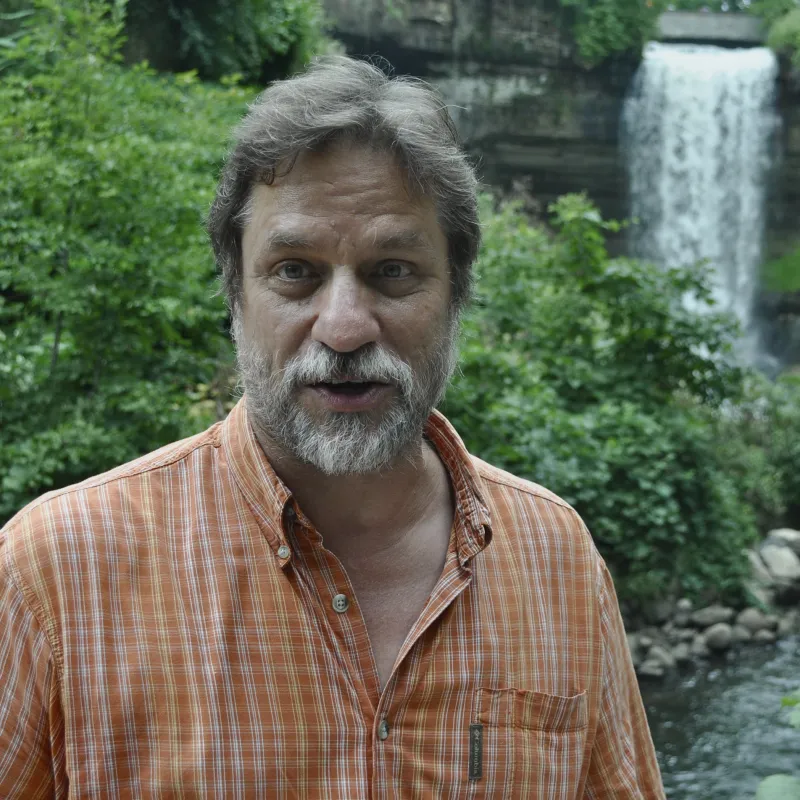
- Home
- Regions
- St Croix River Valley
Canoe, Camp & Color Watch Along the St. Croix River
The St. Croix River Valley is ablaze in red, orange and yellow leaves in the fall, and one of the most peaceful, immersive ways to experience Minnesota's fall color show is paddling a canoe between the densely wooded banks of the St. Croix River.
Much of the 164-mile river forms the border between Minnesota and Wisconsin, and it was one of only eight waterways originally designated as a "National Wild and Scenic River" by the federal government in 1968. It's also widely considered one of the best canoeing rivers in the nation, especially with its clean, clear waters and pristine surroundings.
The riverway was carved by glaciers more than 10,000 years ago, and features rock formations and glacial potholes found in few places on earth. Wildlife watching is exceptional, especially during peak migration in the spring and fall. It's common to see eagles, osprey, great blue herons, belted kingfishers, bluebirds, orioles and dozens of other bird species, and with a little luck and a keen eye, you might see mink, beaver, whitetail deer, fox and maybe even black bear.
The following state parks provide campers and day trippers the perfect entry point to the scenic beauty of the St. Croix. Canoeing and kayaking are perhaps the strongest attraction at many of these parks, but they also offer beaches, hiking and biking trails, picnic areas and modern campgrounds. Visitors wanting to plan their trip around the fall color show should aim for late September to mid-October.

Interstate State Park
Interstate State Park at Taylors Falls is small but distinctive, geologically and otherwise. Massive glaciers retreated from the area about 10,000 years ago, when rushing currents and whirlpools carved deep, circular "glacial potholes" through the sandstone down into the basalt. The view of the river from the cliffs is stunning, especially at the peak of fall color.
Just below the dam that separates the Upper from the Lower St. Croix, narrated scenic paddleboat cruises are offered, some of which include dinner. Another highlight here is rock climbing. Enthusiasts bring their ropes, carabiners and well-conditioned biceps to muscle their way up the steep basalt cliffs. If you're not up to the considerable effort yourself, it's a lot of fun to watch. Modern campsites and canoe and kayak rentals are available. If you're craving a treat or fine meal after a day of exploring, consider walking into downtown Taylors Falls.
It's common to see eagles, herons and dozens of other bird species, and with a little luck and attentiveness, you might see mink, beaver, whitetail deer, fox and maybe even black bear.

William O'Brien & Afton State Parks
William O'Brien and Afton state parks are within an hour of the Minneapolis-St. Paul area and thus perfect for a day trip, but they also both offer excellent camping. The southern section of the St. Croix River is excellent for catching the largest river species, river sturgeon and flathead catfish.
Afton is the closest park on the St. Croix to the Twin Cities, and caters to those looking for a rustic and remote experience close to the metro region. All of the camping and most of the other features of the park are hike-in, with few amenities accessible from the parking lot. There are four camper cabins with heat and electricity, as well as 2 yurts with woodstoves. Twenty miles of hiking trails are available. Themed St. Croix river cruises depart just over the border in Hudson, Wisconsin.
William O'Brien has canoe rentals and a boat launch, 12 miles of hiking trails, more than 100 campsites (75 with electric hookups), four camper cabins, a large, accessible picnic grounds, a fishing pier, and excellent bird and wildlife watching.

St. Croix & Wild River State Parks
St. Croix and Wild River state parks, set on the official "wild and scenic" portions of the river, are particularly quiet and removed from signs of civilization. At 34,000 acres, St. Croix is Minnesota's largest state park. Buildings and other visible structures are few along the Upper St. Croix, and motorboats tend to be less common than canoes, partly because the water tends to be fairly shallow (and slower for less experienced paddlers). Visitors should ask park staff about the water conditions before heading out, and always wear a personal flotation device.
The upper section of the St. Croix River is known to be one of the finest smallmouth bass fisheries in the nation. Anglers also enjoy catching walleye and other fish species. In centuries past, this was prime red and white pine lumbering country; timber was the economic heartbeat of the area for a long time. Now you will see more spruce, tamarack, maple, basswood and jack pine, providing a lovely mix of colors in the fall.
St. Croix State Park rent canoes and necessary equipment if you don't have your own. About a third of the campsites have electric hookups for trailers and RVs, and modern restrooms and showers are available. St. Croix has six camper cabins and two modern guest houses for groups, and Wild River has six rustic camper cabins and a guest house that sleeps six.

